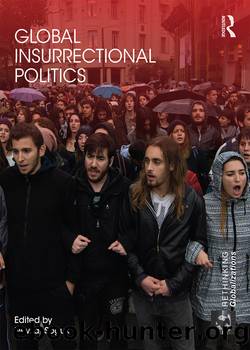Global Insurrectional Politics by Nevzat Soguk

Author:Nevzat Soguk [Soguk, Nevzat]
Language: eng
Format: epub
ISBN: 9781138208490
Google: wTmSDAEACAAJ
Goodreads: 30153414
Publisher: Routledge
Published: 2016-10-06T00:00:00+00:00
Colonial Modernity in Southeast Asia
Naeem Inayatullah and David Blaney state that, for the Western researcher, âmodernity is more than just a model; it foretells the future of all cultural spacesâ (2011, p. 29). Their statement indicates that the template of modernity functions in our research imagination as a kind of natural endpoint into which all social science analysis must culminate. I highlight here the idea that the modern is not simply the product of Western influences intruding upon various self-contained non-Western societies (see Watson Andaya, 1997, p. 396). Several scholars of colonial societies argue that the âmodernâ should be more aptly understood as the product of both the colonial encounter with non-Western societies, but also of the multifaceted interactions and contestations that emerged prior to the establishment of colonial rule. In the case of the Indonesian archipelago, the adoption of new perspectives and worldviews, of new habits and beliefs came from established trade circuits that went back several centuries (see Laffan, 2003; Vickers, 2005; Watson Andaya, 1997), and not least from religious travel networks. The latter involved the circulation of scholarly Islamic knowledge within Southeast Asia, and between Southeast Asia and the Middle East (especially the Hijaz region in Saudi Arabia) or South Asia, as well as the undertaking of the hajj to Mecca (see Laffan, 2003, pp. 18â27). In his study of the emergence of an Islamic vision of Indonesian nationhood during colonialism, Michael Laffan suggests that these scholarly Islamic networks were crucial in shaping âa united vision of a Jawiecumeneâ outside the archipelago, an ecumene that perceived itself also as part of a worldwide Muslim community (2003, p. 20).3
I am not interested here in attempting to establish agency for the colonized (i.e. they were capable of developing their own modernity), or to project âmodernityâ as a âsingularâ and âglobalâ process that was not inherent to Europe but rather âalways instantiated locallyâ within wider socio-political configurations (Soares & Osella, 2009, p. S5). I find neither approach satisfying because they both gesture towards âmodernityâ as an ineluctable and all-encompassing global/local process that excludes any possibility of thinking and engaging the âexterioritiesâ and alternatives to modernity. Furthermore both approaches assume that we all know and agree upon the meaning of âmodernityâ; or, to put it differently, there is an unspoken assumption that whatever its local instantiations, modernityâs meaning remains constant. But, as pointed out in her analysis of modernity in Southeast Asia, historian Barbara Watson Andaya notes how âbeing modernâ in Southeast Asia has historically meant âthat what comes from the outside can be adapted to their own environmentâ (1997, p. 406). In that sense, Europeans were seen as one of the many other modernizers available such as the Turkish and the Persian courts from which significant influences were drawn (Watson Andaya, 1997, p. 401). So there was no perceived contradiction for young Indonesians caught in anti-colonial movements at the beginning of the twentieth century to wear Western-style dress while engaging in fervent anti-Dutch rhetoric, since their style of dressing was
Download
This site does not store any files on its server. We only index and link to content provided by other sites. Please contact the content providers to delete copyright contents if any and email us, we'll remove relevant links or contents immediately.
The Secret History by Donna Tartt(19086)
The Social Justice Warrior Handbook by Lisa De Pasquale(12190)
Thirteen Reasons Why by Jay Asher(8909)
This Is How You Lose Her by Junot Diaz(6885)
Weapons of Math Destruction by Cathy O'Neil(6279)
Zero to One by Peter Thiel(5801)
Beartown by Fredrik Backman(5754)
The Myth of the Strong Leader by Archie Brown(5507)
The Fire Next Time by James Baldwin(5442)
How Democracies Die by Steven Levitsky & Daniel Ziblatt(5218)
Promise Me, Dad by Joe Biden(5153)
Stone's Rules by Roger Stone(5087)
A Higher Loyalty: Truth, Lies, and Leadership by James Comey(4960)
100 Deadly Skills by Clint Emerson(4924)
Rise and Kill First by Ronen Bergman(4788)
Secrecy World by Jake Bernstein(4752)
The David Icke Guide to the Global Conspiracy (and how to end it) by David Icke(4717)
The Farm by Tom Rob Smith(4507)
The Doomsday Machine by Daniel Ellsberg(4490)
